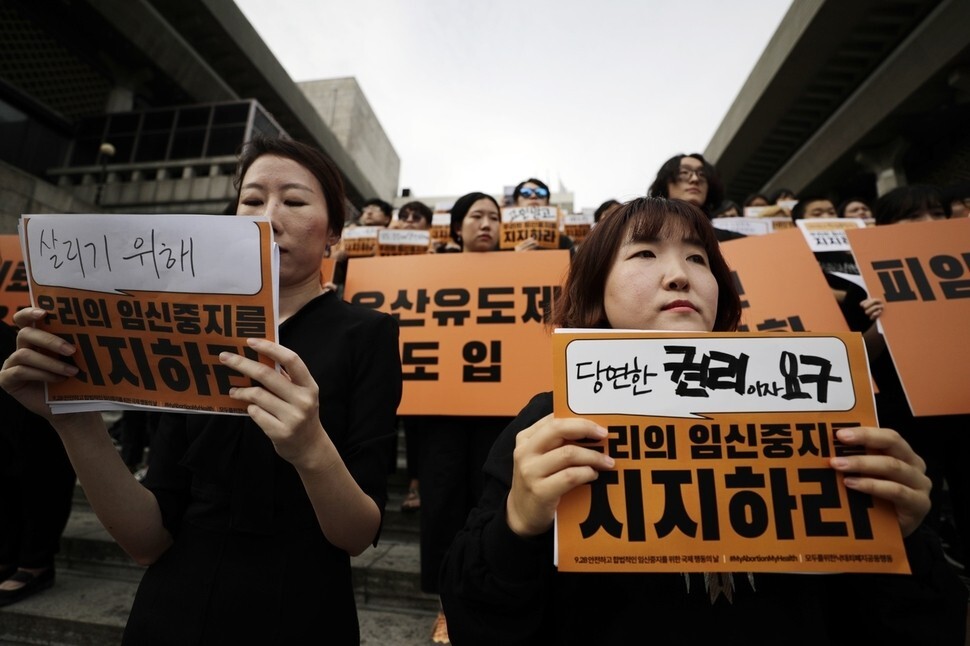hankyoreh
Links to other country sites 다른 나라 사이트 링크
Women still prosecuted for abortions despite Constitutional Court’s ruling saying its unconstitutional

“K” underwent an abortion last year after conceiving a child with her boyfriend. Learning of this, the boyfriend responded with verbal abuse and threats. “You’re a murderer. I’m going to sue you,” he told her -- and he eventually did visit a police station early this year to file a complaint accusing K of abortion. This was after a Constitutional Court decision ruling criminal punishment of abortion to be unconstitutional, but after hearing the accusation, police notified K that they would be proceeding with an investigation on abortion charges. Stunned, K turned to a women’s rights group, explaining her situation and requesting their counseling.
A full year has passed since the Constitutional Court concluded on Apr. 11, 2019, that criminal punishment of abortion is unconstitutional, but women seeking abortions continue to face risks amid delays in revised legislation in the National Assembly. The National Assembly is obligated to amend its provisions punishing abortion by the end of the year -- but the only legislation presented since the Constitutional Court’s decision has been an amendment proposed by Justice Party lawmaker Lee Jeong-mi, which would permit unrestricted abortions through the 14th week of pregnancy. Even that bill is poised to be automatically rejected when the 20th National Assembly session comes to an end. The Ministry of Health and Welfare (MOHW) and other government offices have yet to issue separate guidelines.
One result of this has been a number of internet posts from women seeking abortion medications through illicit channels. “I’ll buy any mifepristone [an abortion inducement medication tested for safety by the World Health Organization] you have left,” one wrote. “I’m in my ninth week, so this is really urgent. Please help me,” wrote another. Some have also expressed confusion over which hospitals they are allowed to go to for procedures amid the absence of government guidelines. A member of the group Womenlink going by the name “Nosae” explained, “Just like before the Constitutional Court decision, we’ve been getting inquiries from people looking for medications and hospitals that perform abortion procedures, but without institutional improvements, there’s really very little help Womenlink can provide.”
The novel coronavirus outbreak has only made the situation worse. Due to the recent outbreak, overseas women groups like Women on Waves and Women Help Women that had been providing abortion medications to women around the world have been unable to supply them to the Asian region. Many are also worrying of a rise in domestic violence as couples spend long periods together in self-quarantine amid the social distancing campaign.
“The risk of violence increases as women spend more time together in enclosed spaces with close partners and family members,” said Lee Yu-rim, a planning committee member with the Center for Sexual Rights and Reproductive Justice (SHARE), noting the possibility of “unwanted sexual intercourse and pregnancies.” Indeed, reports of domestic violence have risen sharply in France, the US, and elsewhere since the imposition of restrictions on outside activities.
Some are now arguing that the legislature, judiciary, and administration should assume joint responsibility after leaving pregnancy terminations in a state of illegality over the past year. Since the Constitutional Court decision, only the prosecutors have announced plans to suspend their indictments for terminations within the first 12 weeks of pregnancy. MOHW and other government offices have argued that they can only devise a new system once a law is in place.
Members of the women’s rights community insisted that the government cannot simply wait for the law to be amended. Moon Seol-hee, an executive committee member with the group Safe Abortion, stressed, “The government needs to be making thorough preparations ahead of the law’s revision, including examining how abortion can be linked with public health services and whether National Health Insurance can be applied, as well as investigating overseas abortion inducement medications.”
By Park Yoon-kyung, staff reporter
Please direct comments or questions to [english@hani.co.kr]

Editorial・opinion
![[Column] Has Korea, too, crossed the Rubicon on China? [Column] Has Korea, too, crossed the Rubicon on China?](https://flexible.img.hani.co.kr/flexible/normal/500/300/imgdb/original/2024/0419/9317135153409185.jpg) [Column] Has Korea, too, crossed the Rubicon on China?
[Column] Has Korea, too, crossed the Rubicon on China?![[Correspondent’s column] In Japan’s alliance with US, echoes of its past alliances with UK [Correspondent’s column] In Japan’s alliance with US, echoes of its past alliances with UK](https://flexible.img.hani.co.kr/flexible/normal/500/300/imgdb/original/2024/0419/2317135166563519.jpg) [Correspondent’s column] In Japan’s alliance with US, echoes of its past alliances with UK
[Correspondent’s column] In Japan’s alliance with US, echoes of its past alliances with UK- [Editorial] Does Yoon think the Korean public is wrong?
- [Editorial] As it bolsters its alliance with US, Japan must be accountable for past
- [Guest essay] Amending the Constitution is Yoon’s key to leaving office in public’s good graces
- [Editorial] 10 years on, lessons of Sewol tragedy must never be forgotten
- [Column] A death blow to Korea’s prosecutor politics
- [Correspondent’s column] The US and the end of Japanese pacifism
- [Guest essay] How Korea turned its trainee doctors into monsters
- [Guest essay] As someone who helped forge Seoul-Moscow ties, their status today troubles me
Most viewed articles
- 1[Column] The clock is ticking for Korea’s first lady
- 2Samsung barricades office as unionized workers strike for better conditions
- 3After 2 months of delayed, denied medical care, Koreans worry worst may be yet to come
- 4[Column] Has Korea, too, crossed the Rubicon on China?
- 5All eyes on Xiaomi after it pulls off EV that Apple couldn’t
- 6[Correspondent’s column] In Japan’s alliance with US, echoes of its past alliances with UK
- 7US overtakes China as Korea’s top export market, prompting trade sanction jitters
- 8Hong Se-hwa, voice for tolerance whose memoir of exile touched a chord, dies at 76
- 9[Editorial] When the choice is kids or career, Korea will never overcome birth rate woes
- 10[Photo] Smile ambassador, you’re on camera